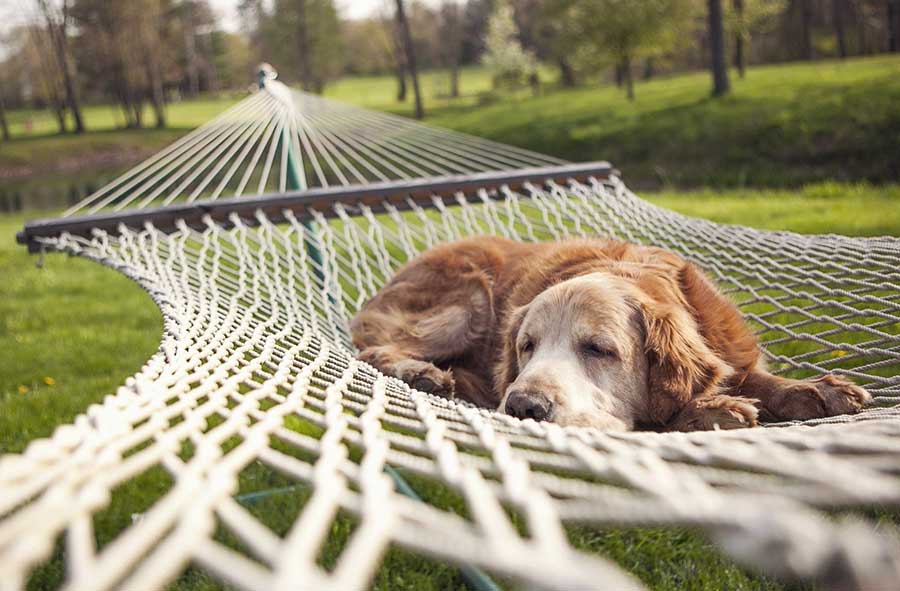
Many canine senior citizens become stiff and sore in their joints as they age. However, there is much you can do to slow the development of arthritis and to manage the symptoms if they occur.
The word ‘arthritis’ comes from two Greek phrases ‘arthro’ which means joint, and ‘itis’ which means inflammation, so arthritis is inflammation of the joints. There are many causes of arthritis in dogs, from infections to immune mediated diseases.
However the type of arthritis most people think of when they hear the term is the age related disease that causes stiff sore joints in canine senior citizens.
What Causes Arthritis?
Arthritis starts when the joint cartilage that covers the ends of the bones deteriorates. Over time, this cartilage is worn down to expose the bone beneath. As the disease progresses, new bone is laid down in and around the joints, and the joint fluid becomes thin and less cushioning. The result is pain and difficulty in moving around.
Why does the cartilage deteriorate in the first place? There are several causes:
- Congenital diseases of the joints such as hip or elbow dysplasia.
- Joint or ligament injury that makes the joint move in an abnormal way.
- Age and obesity. Older dogs are more prone to joint degeneration, and if your canine best friend is carrying excess weight, it will accelerate this process.
Symptoms of Arthritis in Dogs
If your dog starts to develop arthritis, the first thing you are likely to notice is that he is limping. He will try and avoid moving the sore joint. The limp is often worse when he first gets up in the morning, or when the weather is particularly cold.
As the disease progresses, he will be less likely to enjoy his usual activities. He won’t jump up on the couch for a cuddle or chase his ball, and he may be unwilling to walk too far. There can also be wasting of the muscles on the affected leg, so it will look thinner than the corresponding one on the other side. Some dogs even bite at their sore joint to get relief, and this can be mistaken for a skin problem.
Treating the Pain of Arthritis
The two parts to managing canine arthritis are firstly to relieve pain and secondly to return the joint to as healthy a state as possible. There are several treatment options that can help your dog.
- Most dogs are prescribed a non-steroidal anti-inflammatory drug for pain relief. These work well and your dog will be more comfortable very quickly. For those dogs that can’t take these drugs, tramadol and fentanyl are useful. Never give your dog any drug that hasn’t been prescribed by your vet, because they could make him very sick.
- There are many supplements that are thought to help dogs with arthritis. Glucosamine and chondroitin are ones that people are usually familiar with. They are thought to help protect the joint cartilage and slow its deterioration. While supplements aren’t likely to do any harm, there are few studies that confirm their effectiveness.
- Polysulphated glycosaminoglycans such as sodium pentosan polysulphate are substances that are involved in cartilage production. Your vet can give your dog a course of injections of these substances, and many dogs show great improvement in their arthritis symptoms. The advantage of this treatment is that it is very safe.
- Omega 3 fatty acids, such as those found in fish oil, may reduce inflammation and ease pain.
- Your veterinarian may recommend a prescription diet like Hills J/D.
- Acupuncture has been shown to help many dogs with painful joints.
- Gentle exercise, massage and physiotherapy will keep his joints moving freely and help to prevent stiffness.
- Look at your dog’s environment to see if there are changes you can make so life is less difficult for him. For example, if you have stairs leading into your house, give him a ramp so he can walk up it easier.
Arthritis is a progressive condition with no cure. In spite of this, your dog doesn’t need to suffer from painful joints. A combination of weight loss, medication, supplements and modification to his living environment will allow him to enjoy a good quality of life.
Dr Eloise Bright – Love That Pet

